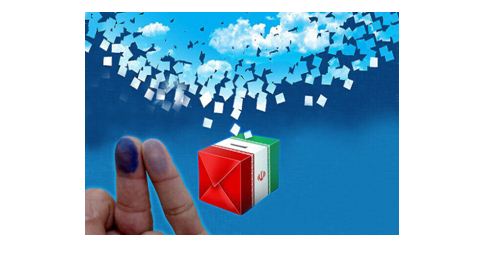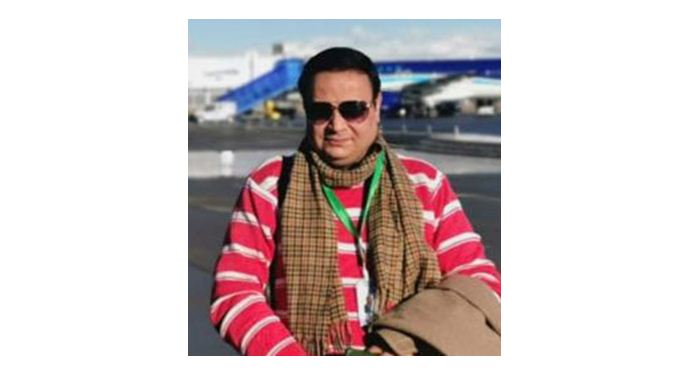Dr. Mehmood Ul Hassan Khan
Electioneering is getting “momentum” in Islamic Republic of Iran because of upcoming 13th Presidential Election to be held on June 18, 2021. It would be one of Iran’s most “significant” elections that could determine Iran’s future “directions” of foreign, economic and military policies in the region and beyond.

However, the elections in 1997, 2005, and 2013 yielded surprising results, signaling unexpected changes but this time it seems that there will be no surprise and presidential election will be closely “contested” between reformists and hardliners.
Furthermore, Iranians will be voting in “four different elections” on June 18. Presidential elections and balloting for local councils will be held across the country while there will be by-elections for parliament and the Assembly of Experts, a group of clerics that theoretically chooses the next Supreme Leader which has further enhanced its strategic orientation, utility and importance too.
There will also be various by-elections for Iranian parliament, which lost some of its members to COVID-19 and others due to the rejection of credentials for some successful candidates after last year’s election. In the Tehran constituency, there is one vacant seat.
Unfortunately, the Assembly of Experts (AEs) has also lost a few members since its last election in March 2016. This by-election is crucial for Supreme Leader Ayatollah Ali Khamenei and those who aspire to succeed him.
Officially, Iran has opened registration for potential candidates in the country’s June presidential election. Registration will end on May 15, 2021. The Guardian Council (GC) will announce a final list of candidates by May 27, and a 20 day campaign begins the following day. Several candidates have already officially announced their presidential bids, while others have only signaled that they would be seeking to contest.
Mostly, presidential candidates must be outstanding political and religious figures. Every candidate must have Iranian origin, a national of the Islamic Republic, prudent and capable of taking on leadership duties, holder of at least master degree, with minimum age 40, and also be religious with a strong belief in the Islamic Republic’s principles and its official religion.
According to its “unique” historical, traditional, religious and cultural “hangover” Iranian political “polity” divides candidates into two “distinctive” categories which include “conservatives” or “hard-liners” and reformists. The conservatives want to expand Iran’s nuclear program and confront the world, moderates who hold onto the status quo and reformists who want to change the theocracy from within.
Historical analysis of Iranian political system reveals that “radical candidates” have not been “accommodated” by its system and various important organs of the “ultimate discretion” mainly office by the Guardian Council (GC) comprising of a 12 member panel that vets and approves candidates under the watch of Supreme Leader Ayatollah Ali Khamenei. The collapse of nuclear deal provided political/electoral comparative advantage to hard-liners which even secured majority in the Iran’s parliament.
It is believed that in case of hard-liner or a conservative candidate victory in the upcoming election especially someone with a military background, there is a likelihood of “intensification” of the standoff with the West.
On its part, prominent reformist leaders have been striving hard to form a political coalition to unite a single banner. But many reformists have termed the body undemocratic, signaling stay away from such unity efforts. Moreover, some other reformist leaders have also shown interest in running for the presidency but it remains unclear if the Guardian Council will approve their candidature.
Conversely, the reformist camp has various subgroups consisting of radicals and pragmatists orientations. Incumbent president Rouhani has always been labeled as a pragmatist, who was roped in by the camp in 2013 to contest polls. There have been serious differences between Rouhani and radical reformist politicians to the point that they have regretted backing him for two terms in office, which has further added to their woes.
On the contrary, conservatives, also face a similar struggle with many contenders in the presidential election race. But it seems hardliners may be in the driving seat in the upcoming presidential election 2021 because of so many complex and complicated internal and external reasons.
Undoubtedly, there are some new faces have now joined the race, hoping to spring a surprise but their chances of victory are limited. It hopes that a close electoral contest between conservatives and reformists will further strengthen process of politicization and democratization in Iran during which potential winner may have the support of non-traditional political polity.
In this context, both camps have their own strengthens and weakness which may also play an important role in the upcoming presidential election. Critical analysis upheld that conservatives always struggled to pick a consensus candidate, something which used to help the reformists.
But it seems that constant economic meltdown of Rouhani’s regime because of the sever US socio-economic sanctions, high inflation, price hikes, limited new jobs and declining state’s space to assist and rescue the people from the deep seas of poverty may spoil the chances of a reformist to win the electoral race of presidency on June 18.
Moreover, reformists or moderates defeat in the parliamentary elections of 2020 would also be a stumbling block for the victory of any reformist candidate to win the election this time.
However, as consensus evades in both camps to decide about candidates, many familiar and unfamiliar names have joined the fray to invite attention and seek candidacy.
Despite Western routine propaganda and fake media campaigns it hopes that the upcoming Iranian 13th Presidential election would be more momentous, simply because it will be held in much more different circumstances. The ongoing human sage of deadly coronavirus pandemic will require the Iranian government to put into place new SOPs to protect voters from Covid-19. Economic challenges will be decider.
Although Rouhani’s regime desires to reach a break through on the JCPOA but these efforts seem to be difficult making the next presidential election even more important as it will produce the next Iranian government that will lead the efforts to lift socio-economic sanctions.
Several possible candidates have emerged from Iran’s powerful Revolutionary Guard (RG). They include Mohsen Rezaei, an outspoken former top commander; Hossein Dehghan, an adviser to Khamenei; Rostam Ghasemi, a former oil minister; and Mohammad Bagher Qalibaf, the speaker of Iran’s parliament known for his support of a bloody crackdown on students in 1999.
A young generation of Guard leaders is in the mix as well, led by 53 year-old Saeed Mohammad, who once headed the paramilitary force’s Khatam al-Anbiya Construction Headquarters, which is one of Iran’s biggest business conglomerates.
Outside of the Guard, hard-line judiciary Chief Ebrahim Raisi has had his name mentioned as well. Raisi ran unsuccessfully against Rouhani in 2017 despite winning 15.8 million votes, but the cleric remains popular among many as he’s led a publicized anti-corruption push. Former parliament speaker and special China envoy Ali Larijani also has been suggested as a candidate.
Iran’s 2020 parliamentary vote witnessed only a 42.5 percent turnout, the lowest ever since 1979. Official surveys suggest June’s vote may see only a 39-40 percent turnout. Iran’s 2017 presidential election saw a 73 percent turnout.
Statistical analysis of Iranian population upholds that roughly 35 percent of the Iranian population lives in rural areas where village councils play a crucial role in people’s daily lives due to which a high turnout up to 70 percent is expected in the upcoming elections.
Moreover, 20 percent of the Iranian population lives in smaller towns where council turnout has usually been around 60 percent. The politicization of these populations occurred in the midst of the December 2017 to January 2018 protests.
In bigger cities and in provincial capitals people have mostly voted according to political and social preferences there will likely be very low turnout, which could guarantee an easy victory for the hardliner camp, especially for city council members.
In Tehran, this means the politically influential post of Tehran mayor could change hands soon. This post has been a launching pad for national office in the past; Mahmoud Ahmadinejad ran successfully for president in 2005 after having served as Tehran mayor. It means that geographical presentations of Iran will play an important role in the upcoming elections to be held on June 18, 2021.
It seems that Saeed Mohammad, the former head of IRGC’s construction wing Khatam al-Anbiya would be dark horse in the upcoming presidential election. Like former Iran President Mahmoud Ahmedinejad, who pulled a big upset in 2005, Mohammad has also emerged as a dark horse who could upset the plans of other relatively stronger and more popular contenders.
Being prominent regional expert on Iran & GCC I guess presidential election campaign will be contested on economic sanctions, the nuclear deal, and the ongoing economic crisis. The reformists will blame the national economic meltdown because of the US sanctions which left no choice for them to protect the economic interests of the people. On the other hand hardliner held mismanagement and inefficiency of the government for constant economic poor performance.
Opening of national economy resulting from sanctions relief and the revival of the Joint Comprehensive Plan of Action (JCPOA) has the potential to mitigate the hardliners justifications. On the contrary, it seems that the fundamentalist camp is in no rush to facilitate either of those two things while the Rouhani team is pushing the Biden administration to act on them as soon as possible.
Rapidly emerging socio-economic strategic deals in the region and beyond (China-Iran Strategic Deal for US$ 400 billion, opening of new trade routes with Pakistan, along with promising socio-economic integration/partnership under flagship project of the BRI & CPEC), bright prospects of regional geopolitical reconciliation (Iran-Saudi sincere efforts for diplomatic diffuse) and last but not least geostrategic realignment especially on the US-Iran nuclear deal etc. all indicate strategic importance of upcoming Presidential Election of Iran.
Let us hope that democracy will not be compromised because of any invisible concession or contradiction. Let Iranian people decide their fates through ballots in which every vote counts and matters.

















